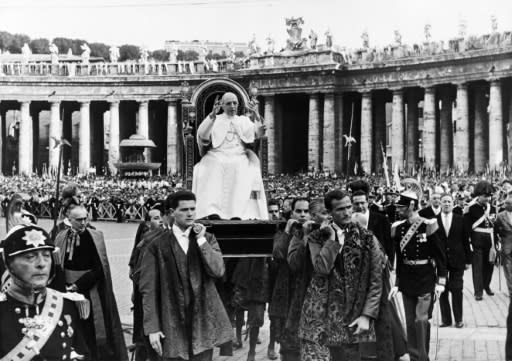Four things to know about Pope Pius XII's archives
The March 2 unsealing of the archives of Pope Pius XII, the controversial World War II-era pontiff, whose papacy lasted from 1939 to 1958, has been awaited for decades by Jewish groups and historians. The controversy over Pius XII hinges on whether the head of the Catholic Church, a former diplomat of the Holy See in Germany, remained too silent during the Holocaust, never publicly condemning the Nazis. Here are four key points to better understand the archives' importance. - Holocaust: a mass of already published material - The most sensitive archives, comprising the World War II period, have already been largely published by the Vatican. In 1981, four Jesuit priests compiled documents from Pius XII's archives, titled "Acts and Documents of the Holy See Relating to the Second World War." Though comprehensive in its eleven volumes, the work did not give historians studying the period direct access to all documents. - Pre-papacy years - Much information on Pius XII, who was Cardinal Eugenio Pacelli before assuming the papacy, has come from 30,000 volumes of the archives of Pius XI, whose papacy lasted from 1922 to 1939. In 1930, Pacelli was appointed Secretary of State, the number two post within the Vatican. Three years later, he signed a concordat with Hitler's Germany on relations between the German authorities and the Church. These archives also cover much of Pacelli's long stay in Germany from 1917 to 1929 as nuncio, or ambassador of the Holy See, during Hitler's rise to power. - The Church defends a 'just man' - The Catholic Church has always argued that Pius XII helped rescue several thousand Jews by having them hidden in religious institutions in Rome during the German occupation. It also believes the Pope's refusal to verbally attack the Nazis avoided reprisals against Catholics in Europe. The process for the beatification of Pius XII began in October 1967. Then-Pope Benedict XVI proclaimed him "venerable" in 2009, the first step towards sainthood on condition that a miracle be recognised - a decision that spurred an outcry among Jewish organisations. A year later, Benedict called Pope Pius XII "one of the great righteous, who saved Jews more than anyone else." "He personally suffered enormously, we know that. He knew he had to speak out, yet the situation forbade him to do so," Benedict noted. In 2014, Pope Francis said he had "a bit of existential hives" in the face of attacks on Pius XII, "a great defender of the Jews". - Critics attack his silence - Pius XII - a moral voice likely to have been heeded by German Catholics - is vilified by many historians for never having explicitly condemned the extermination of the Jews by the Nazi regime. The member of the Roman nobility is also criticised for having remained silent when on October 16, 1943 over a thousand Roman Jews were rounded up in their ghetto not far from the Vatican. Following the roundup, some Jews were hidden in Catholic institutions, but critics point out that no written document exists to prove that Pius XII was responsible. Many historians conclude that while this pope may have disapproved of Hitler's anti-Semitism, he was also the product of traditional anti-Jewish Catholic teaching until the Second Vatican Council from 1962 to 1965, which positively transformed Catholic-Jewish relations. Thus, the Jews were not the priority of this Pope, who was instead concerned about the fate of Catholics and fiercely opposed to communism, they argue. The controversy over Pius XII hinges on whether he remained too silent during the Holocaust, never publicly condemning the Nazis Pope Benedict XV1 called Pius XII '"one of the great righteous, who saved Jews more than anyone else'



